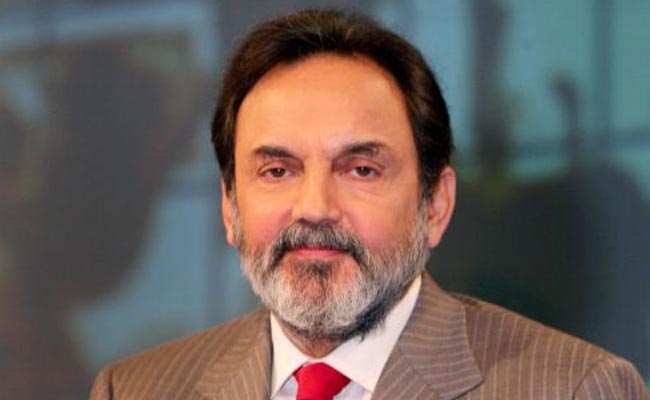News Anchor
Prannoy Roy Wiki,Early life, Awards,Net Worth,Lifestyle,Relationship and more

Biography of Prannoy Roy: Pioneer of Indian Television Journalism
Early Life:
Prannoy Roy was born on October 15, 1949, in Calcutta (now Kolkata), West Bengal, India. He was raised in a prominent family, with his father being the founder of the Indian National Army and his mother, a prominent educationist. From an early age, Roy exhibited a keen interest in academics and current affairs.
Education:
Roy pursued his education at The Doon School in Dehradun, India, and later attended the Haileybury and Imperial Service College in the United Kingdom. He went on to study Economics at the University of London and completed his PhD in Economics from the Delhi School of Economics, University of Delhi.
Career Beginnings:
Roy began his career as an economic adviser to the Indian government before transitioning to journalism. He started as an anchor and reporter for Doordarshan, India’s national television broadcaster, where he gained experience in broadcast journalism.
Rise to Prominence:
Roy’s rise to prominence came when he co-founded New Delhi Television (NDTV) in 1988, along with Radhika Roy, his wife. NDTV quickly became one of India’s leading news channels, pioneering 24-hour television news broadcasting in the country.
Journalism and Activism:
Throughout his career, Roy has been a strong advocate for media freedom, democracy, and social justice. He has used his platform as a journalist to raise awareness about pressing social and political issues and to hold those in power accountable.
Awards and Recognitions:
Roy’s contributions to journalism have been widely recognized and honored. He has received several prestigious awards, including the Padma Bhushan, one of India’s highest civilian honors, for his exceptional contributions to the field of journalism.
Personal Life:
Prannoy Roy is married to Radhika Roy, who is also his business partner in NDTV. The couple shares a deep commitment to journalism and media activism. They have two children, Niharika and Tara, who are also involved in the media industry.
Less Known Facts:
- Statistical Expertise: Roy is known for his expertise in statistics and data analysis, which he often employs in his reporting to provide in-depth analysis of complex issues.
- Authorship: In addition to his work as a journalist, Roy is also an author. He has written several books on topics such as economics, politics, and media, offering insights into India’s socio-economic and political landscape.
- Philanthropy: Roy is actively involved in philanthropic initiatives aimed at promoting education, healthcare, and social development in India. He has supported various charitable organizations and initiatives focused on empowering marginalized communities.
- Global Influence: Roy’s influence extends beyond India, with his reporting and analysis being widely respected internationally. He has been invited to speak at various international forums and conferences, where he shares his insights on global issues.
- Entrepreneurship: In addition to his role as a journalist, Roy is also an entrepreneur and has been involved in various business ventures outside of NDTV, including investments in technology startups and media companies.
FAQs:
1. What inspired Prannoy Roy to pursue journalism as a career?
Prannoy Roy’s upbringing in a family with a strong legacy in public service and his passion for truth and justice inspired him to pursue journalism. He saw journalism as a powerful tool for informing and empowering the masses and believed in its ability to drive positive social change.
2. What are some of Prannoy Roy’s most significant contributions to Indian journalism?
Prannoy Roy’s establishment of NDTV as a leading news channel in India and his pioneering efforts in introducing 24-hour television news broadcasting in the country are among his most significant contributions. He has played a pivotal role in shaping the landscape of Indian journalism and promoting journalistic integrity and excellence.
3. How does Prannoy Roy navigate the challenges of maintaining editorial independence in NDTV?
Prannoy Roy has emphasized the importance of editorial independence and journalistic integrity in NDTV’s operations. He has implemented strict editorial policies and guidelines to ensure impartial and unbiased reporting, despite external pressures and influences.
4. What role does Prannoy Roy envision for journalism in shaping India’s future?
Prannoy Roy believes that journalism plays a crucial role in shaping public opinion, fostering dialogue, and holding those in power accountable. He envisions a future where journalism serves as a beacon of truth and democracy, empowering citizens and promoting social justice.
5. How does Prannoy Roy balance his professional responsibilities with his personal life?
Prannoy Roy prioritizes his professional commitments while also making time for his personal interests and family. He believes in maintaining a healthy work-life balance and strives to excel in both aspects of his life, recognizing the importance of personal well-being in achieving professional success.
Controversies:
- CBI Raids on NDTV: In 2017, NDTV and its founders, Prannoy Roy and Radhika Roy, were subjected to raids by the Central Bureau of Investigation (CBI) over allegations of financial irregularities. The raids were widely criticized by journalists and media watchdogs, who saw them as an attack on press freedom.
- Editorial Independence Concerns: NDTV has faced criticism over allegations of editorial bias and lack of independence, particularly in its coverage of political issues. Critics have accused the channel of being overly sympathetic to certain political parties and agendas, raising questions about its credibility as a news organization.
- Tax Evasion Allegations: NDTV and its founders have been embroiled in controversies over allegations of tax evasion and financial impropriety. The channel has faced scrutiny from tax authorities and regulatory bodies, leading to legal battles and public controversies.
- Political Pressure: NDTV has faced accusations of succumbing to political pressure and censorship, particularly during periods of political turmoil and unrest. Critics have accused the channel of self-censorship and toeing the government line to protect its business interests.
- Exit of Senior Journalists: NDTV has witnessed the departure of several senior journalists and editors over the years, leading to speculation about internal conflicts and management issues within the organization. The exits have raised questions about the channel’s editorial direction and workplace culture.
| Attribute | Details |
|---|---|
| Full Name | Prannoy Roy |
| Nickname | N/A |
| Nationality | Indian |
| Zodiac/Sun Sign | Libra |
| Birthplace | Calcutta, Bengal, British India (now Kolkata, India) |
| Current Address | N/A |
| Parent’s Name | N/A |
| Siblings | N/A |
| Wife or GF or Husband | Radhika Roy (Spouse) |
| Children | Tara Roy, Trishla Roy |
| School | The Doon School, Dehradun |
| Awards | Padma Bhushan (2001) from the Government of India |
| Ramnath Goenka Excellence in Journalism Award (2006) | |
| Alma Mater | Queen Mary University of London, London |
| Highest Qualification | PhD in Economics |
| Net Worth | N/A |
| Hobbies | Reading, Traveling |
| Height | N/A |
| Weight | N/A |
| Prannoy Roy (@PrannoyRoy7749) / X | |
| N/A | |
| Prannoy Roy (@_prannoy_roy) |
Conclusion:
In conclusion, Prannoy Roy is a pioneering journalist and media entrepreneur whose contributions to Indian journalism have been instrumental in shaping public discourse and promoting press freedom. From his early days as a reporter to his current role as the founder of NDTV, Roy has demonstrated a steadfast commitment to truth, integrity, and ethical journalism. Despite facing controversies and challenges throughout his career, he has remained true to his principles and values, using his platform to advocate for democratic values, social justice, and media freedom. As he continues to inspire and influence
the next generation of journalists, Roy’s legacy will endure as a testament to the transformative power of journalism in a democratic society.
